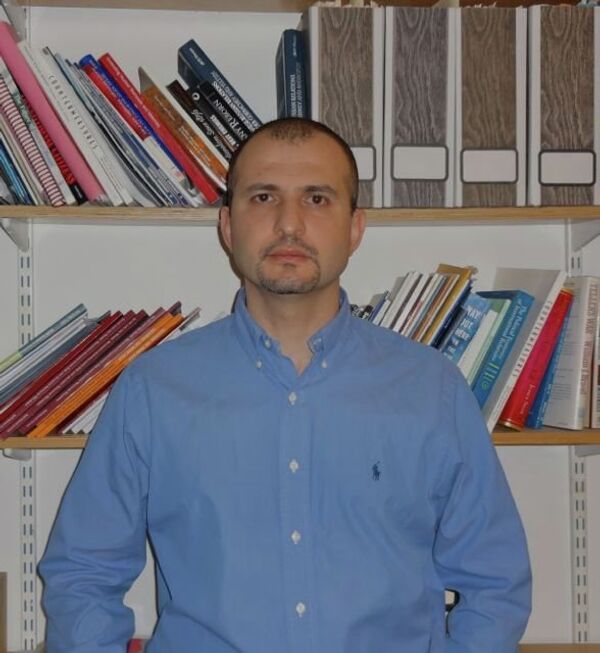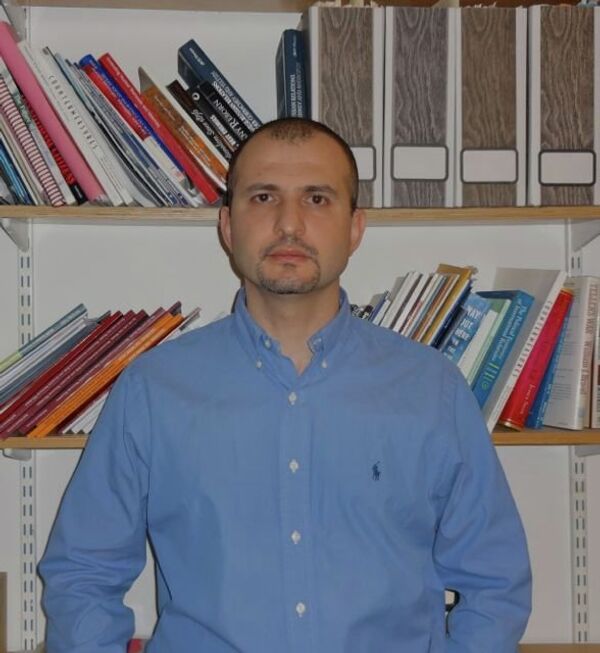None of the leaders of the countries involved in the Iran nuclear talks in Geneva has failed to claim credit for the successful outcome, and Russian President Vladimir Putin is no exception.
“Russia has always advocated diplomacy and talks in tackling Iran's nuclear problem…. the Geneva action plan is based precisely on these kind of ideas and approaches,” Putin said.

The Joint Plan of Action caps Iran’s enrichment of uranium at 5 percent for six months, dilutes half of the country's 20 percent-enriched uranium and suspends activities at Natanz Fuel Enrichment Plant, Fordow and the Arak reactors in exchange for a modest relief in international sanctions.
Putin has every reason to feel vindicated for insisting on the diplomatic solution all along. But as he and US President Barack Obama have noted, the November 24 deal is just one in many steps needed to ensure the Iranian program is peaceful.
To some this journey may seem to be doomed from the outset as they consider Iran to have already become a virtual nuclear state.
By mastering the capability to enrich uranium to 20 percent, the Iranians are already nine-tenths of the way to acquiring nuclear weapons and it won’t take them long to take the remaining steps if they decide to do so.
If Tehran were to do that, it would take them a mere two to three months to enrich uranium to weapons-grade level and then build a fissile bomb, according to a recent estimate by my colleague, Graham Allison.
Uranium bombs produced in such haste would most likely be rather crude devices too cumbersome to be delivered by a missile, which would be Iran’s most credible means of nuclear deterrence. But even a crude device could suffice, as the case of North Korea has demonstrated.
Of course, there is always the military option that the United States and its allies could exercise before Iran acquires such a device.
US air strikes alone will not erase the nuclear know-how from the Iranian knowledge base, however, and neither Washington nor its allies have any appetite for launching a third land war in the Greater Middle East.
But not all hope is lost.
While nuclear power status could insure Iran against outside military aggression and cement its position as a regional behemoth, there is a precedent for a country abandoning nuclear weapons program after seeing external threats dissipate.
That country was South Africa, which developed nuclear weapons to deter aggression by members of the social bloc, but then gave them up as the threat vanished in the late 1980s. Like South Africa, Iran may decide that it could be content with being a virtual nuclear power if and when external threats to the regime become negligent.
Western powers have been busy trying to raise the price Iran would have to pay for purportedly striving for nuclear weapons. But maybe it is time they make an earnest effort to reduce the value that nuclear weapons have as an instrument for defending Iranian national interests in the eyes of decision-makers in Teheran Washington could offer Iran to lift all sanctions and give assurances that it will neither use force against Iran nor attempt any covert regime change in exchange for a verifiable promise from Tehran to refrain from enriching uranium above 5 percent or producing plutonium.
That arrangement would not eliminate Iran’s nuclear know-how, but as long as it held, Tehran would have no powerful incentives to attempt breakouts.
The appeal for the international community should be evident.
World powers realize a nuclear-armed Iran will prompt Saudi Arabia and others to follow suit in what may eventually turn the Middle East into a nuclear “don’t ask-don’t tell” zone, instead of the WMD-free zone they have been hoping for.
Such a development would deal a final blow to the already ailing nuclear non-proliferation regime that permanent members of the UN Security Council and Germany, who negotiated with Iran in Geneva, are trying hard to save.
There would be benefits for individual great powers too.
The United States will advance in its efforts to untangle itself from the Middle East and focus on executing its much talked-about pivot to Asia. A rapprochement between the United States and Iran would not be welcomed by some of its allies, but at the same time I don’t think survival of any of these allies would be in doubt as long U.S. continues to provide security guarantees for them.
Russia’s leadership would also breathe a collective sigh of relief as the alternative to a peaceful dissolution of Iran's nuclear program would be war that would spark instability on the country’s fringe. That would result in geopolitical changes outweighing any economic benefits from the resulting spike in oil prices.
Another possible benefit would be a scaling-down of US plans to deploy ballistic missile defenses in Europe, a possibility that top US diplomat William Burns has touted when making a case on Obama’s behalf in Moscow on why Russia should help the United States prevent a nuclear Iran.
Russia will work hard to attain a lasting solution to the Iranian nuclear issue through diplomatic means, but Moscow doesn’t have sufficient leverage with Iran to single-handedly secure a final deal.
If anyone can deliver the assurances expected by Tehran, it is the United States. That much was made clear by the months of secret talks led by Burns and his Iranian counterpart in the run-up to the November 24 agreement.
Simon Saradzhyan is a researcher at Harvard Kennedy School's Belfer Center. His research interests include international security, arms control,
counter-terrorism as well as political affairs in post-Soviet states and their relations with major outside powers. Prior to joining the Belfer Center in 2008 Saradzhyan had worked as deputy editor of the Moscow Times and a consultant for the United Nations and World Bank. Saradzhyan holds a graduate degree from the Harvard University.
The views expressed in this column are the author’s alone.
View From the Global Tank: Russia’s Rich Start Learning the Joy of Giving
View From the Global Tank: Russia Needs Silver Lining as Energy Market Prospects Look Grim
View From the Global Tank: Russia, America Struggle to Kick MAD to the Curb
View From the Global Tank: Georgia’s NATO Wish Is Understandable, But Difficult to Grant
View From the Global Tank: What Would Don Fanucci Say on Using Missiles to Coerce Assad?
View From the Global Tank: Striking Syria May Be Unavoidable – But Mission Creep Must Not Be
View From the Global Tank: Obama-Putin: Now It's Personal?
View From the Global Tank: Our Changing World Order – the More Options for Cooperation, the Merrier
View From the Global Tank: Appointing Rice, Power Won’t Alter Obama’s Policy on Syria, Russia
View From the Global Tank: Missile Defense Need Not Derail US-Russian Relationship



